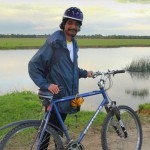22nd October 2012 New Delhi, India
Are you a future science leader of India?
Now entering its second year the Chevening Rolls-Royce Science and Innovation Leadership Programme (CRISP) is open for applications for the academic year 2013. This 11 week programme aimed at high-flying mid-career scientists and innovators is held at the Saïd Business School at the University of Oxford. It offers lectures, workshops, debates and meetings with high-profile companies and scientists to help explore innovation and science policy, from an academic, practical and personal perspective.
 If this might be for you, we thought we’d whet your appetite with a couple of experiences from last year’s group. At the start of their programme, they were welcomed to the UK Department for Business, Innovation & Skills in London by Minister David Willets and Director General for Knowledge & Innovation Professor Sir Adrian Smith. They also met with colleagues from the Science and Innovation Network, who presented and answered questions on the latest UK research and innovation policies.
If this might be for you, we thought we’d whet your appetite with a couple of experiences from last year’s group. At the start of their programme, they were welcomed to the UK Department for Business, Innovation & Skills in London by Minister David Willets and Director General for Knowledge & Innovation Professor Sir Adrian Smith. They also met with colleagues from the Science and Innovation Network, who presented and answered questions on the latest UK research and innovation policies.
One of the 2012 scholars was Professor Arnab Bhattacharya, a scientist working in the area of novel semiconductor materials and devices at the Tata Institute of Fundamental Research (TIFR) in Mumbai. His research group at TIFR has made important contributions in nitride semiconductors and nanowire devices, but what really drives Arnab is his passion for science outreach. He’s a much sought after speaker who enjoys talking about science and demonstrating science experiments to all audiences, particularly school and college students. Arnab conceptualized and runs “Chai and Why?” a popular twice-a-month science café in Mumbai. With intriguing names such as “Suck, Squeeze, Bang, Blow!” and “Khushboo Ya Badboo? It’s all in the brain” these sessions are open to anyone who wants to go drink some chai and discuss the topics with other science enthusiasts. For more details look at his webpage and the Chai and Why Facebook page?
Arnab says he found the CRISP 2012 programme useful, not just for the interesting discussions in the classroom, but also for the opportunity to meet with a lot of scientists and science communicators across the UK. He really misses the inspiring long walks and cycle rides around Port Meadow and Whytham Woods.
Another CRISP 2012 scholar was T. J. James. He is part of a group of professionals who have started an organization Innoaction India for promoting frugal innovations. Recently, they also launched innovation management programmes for college students and school children. T.J. James says that expertise, exposure and experience gained in the CRISP programme were one of the key motivations and inspirations for starting this venture.
Do you think you could be a future science leader of India like Arnab and T. J James? For more information about the Chevening Rolls-Royce Science and Innovation Leadership Programme and details on how to apply see the Chevening pages on the UK in India website. The closing date is 18 November 2012.
CRISP is an appropriate platform for learning future leadership qualities.
This is an excellent program. My senior Mr. Ashish Mehrotra, Director(Safety) in Ministry Of Railways, Government Of India, New Delhi has attended this 11 week course (Rolls Royce, Chevening Scholarship). He is a changed man. He has gained a lot it gives him a cutting edge. This year i am interested to avail this opportunity and undergo 11 week course in 2013. Now let me see whether i prove to be so lucky to get selected for this program.
Thanks for the comment Dr Sarangi, the eligibility requirements are towards the bottom of this page:
http://ukinindia.fco.gov.uk/en/about-us/working-with-india/KnowledgeEconomy/Chevening/CheveningScholarshipsInIndia/CheveningRollsRoyceScholarship/
You’ll see the primary requirements are around the ‘Chevening’ qualities like leadership potential and a talent for innovation and creativity. You also need a minimum 10 years work experience after your first degree. It’s about excellent individuals, not institutions!
People from small institutions like me should be given scope for it.